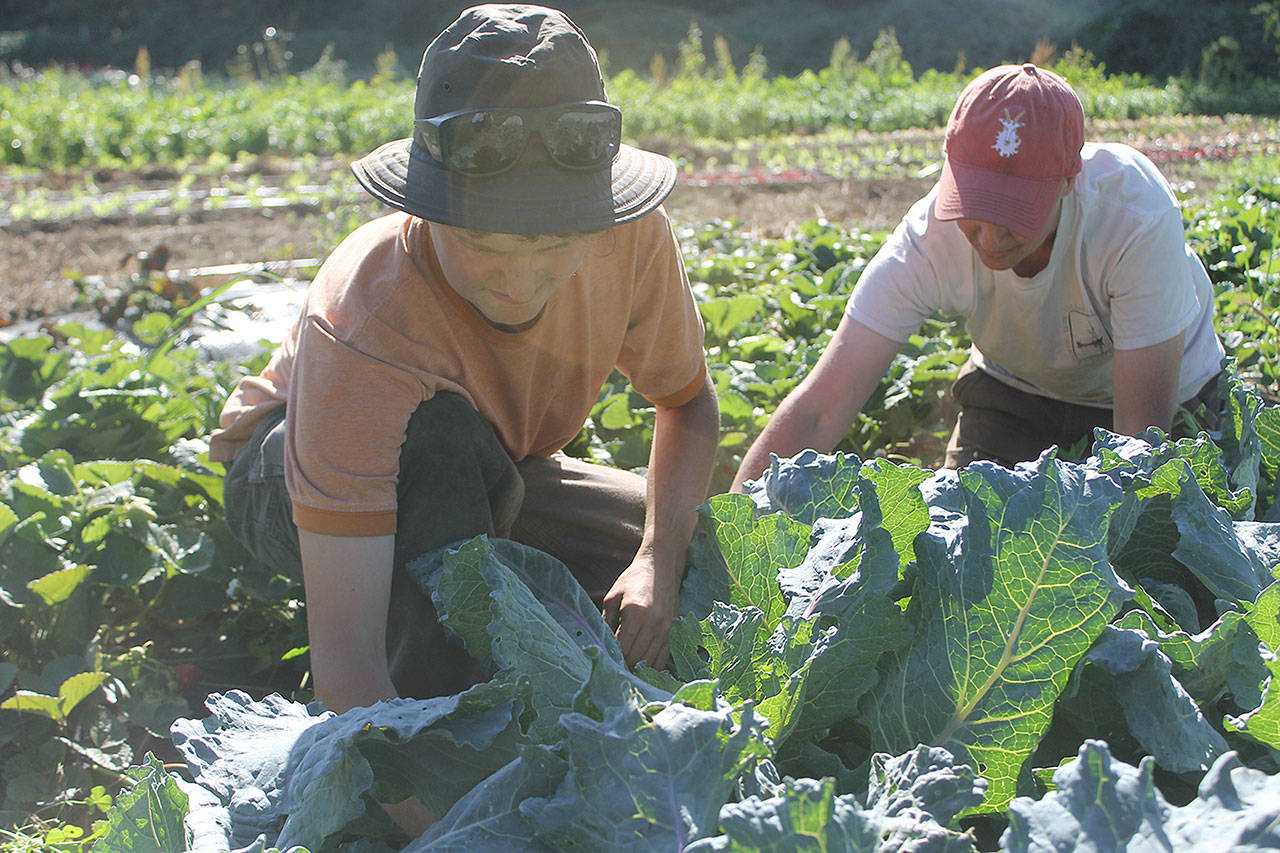Interns can be a rare commodity in the world of small farming.
It turns out that they’re also an indispensable work force, at least in the eyes of Elizabeth Wheat of Skyroot Farm and Camille Green of Good Cheer Food Bank. Both farms are participating in the Washington State Department of Agriculture’s Farm Internship Program, which allows small farms with annual sales of under $250,000 to hire up to three interns.
The interns are typically those who are interested in learning the intricacies of farming and are considering careers in agriculture, Wheat said, who co-owns the Clinton-based farm. Wheat added that the program has many benefits, from educating young people to helping support and grow the small-farm industry. It not only makes it possible for Skyroot Farm to host interns but also allows Wheat to divert her attention to other meaningful projects around the farm.
In a broader sense, Wheat says supporting small farms directly benefits the local economy as her farm continues to spend much of its budget at places like Sebo’s Do-It Center and Hanson’s Building Supply.
“Small farms are incredible powerhouses of keeping rural economies alive,” Wheat said. “I think it’s really important.”
The program was passed by the state Legislature in 2014 and is currently offered in 20 other counties, including King, Kitsap, San Juan, Skagit and Snohomish. It’s the second year Skyroot Farm, which is co-owned by Wheat and Arwen Norman, has participated.
Wheat said that in the history of farming, techniques and knowledge were passed down from generation to generation, or through apprenticeships. Times have changed, however, as it’s typically not economically feasible for farms to hire interns. She says that the training program can replicate the method of teaching young people the trade, while farms are also exempt from wage requirements which makes affording interns possible. Wheat says it’s typically the other way around, where young people pay for education.
Camille Green, garden manager for the Good Cheer Food Bank, said interns are “indispensable” to food bank’s larger goal of “increasing local food systems and sustainable agriculture.”
“For me, I think it’s more about educating these people who want to be involved,” Green said. “That’s one of the biggest positive forces. It brings in new energy, people who have fresh eyes.”
Stoni Tomson, 24, is an intern at Skyroot, but was also an apprentice at Good Cheer this past year. The two farm’s internship programs represented two different paths she could take with a career.
Skyroot gives training and education on the principles of farming, how to use various tools to improve a farm’s effectiveness and systemic approaches to problem solving. Tomson said Good Cheer mainly focused on producing food for a community and the needy, while it also has its interns help organize work parties and collaborate with other local programs.
She said that both have been beneficial to her growth as a farmer, a pursuit which she says fits her core values.
“I think it’s a really fantastic opportunity for people to learn about something that’s really important,” Tomson said. “As the world changes, I think these skills are going to be more and more important. To me, I’d say it’s a calling that’s political and maybe a little bit spiritual and maybe a little bit culinary. I just really like to eat good food. It’s a way into all of these things.”
Starting in the spring, Wheat teaches her interns how to practice crop rotations, feed animals, manage a budget, manage a pasture, operate machinery and fulfill a plethora of other activities around the farm. Ultimately, the interns are involved in nearly every aspect of the farm’s operation.
Wheat added that a representative from the state visited the farm to show the state’s support for Skyroot Farm’s participation. But, the representative also said that not as many small farms have signed up for the program as originally intended. Wheat says she feels “privileged and honored” that her farm has been able to participate and hopes the Legislature still thinks its worth keeping.
Wheat is optimistic that the program will stay alive, but wants to make sure it’s known how vital it is.
“I feel like it’s important to be talking about,” Wheat said. “Maybe other farms will join.”
Both Skyroot Farm and Good Cheer Food Bank are teaming up later this month. The two farms will take their interns on a tour of tiny homes in Langley as part of an “education day” to learn more about sustainable living practices.


